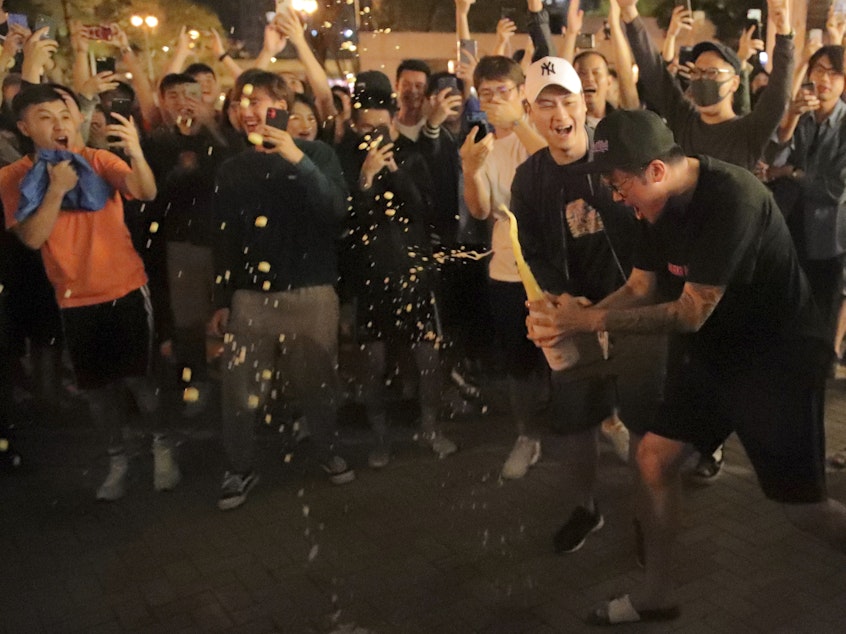Pro-Democracy Candidates Make Election Gains In Statement To Beijing

After months of protests, pro-democracy candidates in Hong Kong appeared on course to make major gains in local elections on Sunday in what many activists are calling a rebuke of Beijing.
Results for Hong Kong's district council elections trickled in well into Monday morning local time as residents gathered in the streets to pop champagne and celebrate winning candidates.
Early returns showed pro-democracy candidates taking at least 201 of 452 district council seats, up from 124.
Hong Kong's district councilors typically handle municipal projects like collecting garbage, maintaining parks and repairing street lights. But with anti-government protests now in their sixth month, the results of these low-level elections have been closely watched.
On Sunday, long lines wrapped around city blocks as voters rushed to the polls in record turn out. The city reported that more than 2.9 million people voted, a turnout rate of more than 71%. More people voted in Sunday's local election than any election in Hong Kong to date.
Sponsored
Joshua Wong, a pro-democracy activist, on Twitter called the results "historic."
"Hong Kongers have spoken out, loud and clear," he wrote. "The international community must acknowledge that, almost six months in, public opinion has NOT turned against the movement."
Early in the night, pro-democracy candidates scored several upset victories. In many cases, first-time candidates and protest veterans defeated longtime pro-Beijing legislators.
"This is the power of democracy. This is a democratic tsunami," said Tommy Cheung, a former student protest leader who won a seat in the Yuen Long district near the border with Mainland China.
Many analysts viewed Sunday's elections as a test for public support of the protests. Clashes between demonstrators and police have become increasingly violent in recent weeks. Earlier this month, pro-democracy protesters hurled gasoline bombs and police used tear gas and water cannons during a standoff at the Hong Kong Polytechnic University campus.
Sponsored
The protests in Hong Kong began in June, when an extradition bill that would have allowed suspected criminals to be sent to Mainland China drew millions of demonstrators to the streets. Hong Kong's chief executive, Carrie Lam, ultimately withdrew the bill.
As NPR's Emily Feng has reported, activists viewed that move as insufficient and throughout the protest movement have called for direct elections of the chief executive and an independent inquiry into police tactics.
Against this backdrop, the district elections have taken on an outsize significance, and voters have mobilized in unprecedented fashion. Government voter registration statistics show that more than 4.1 million people were registered to vote Sunday in a city of around 7.4 million, the highest level ever recorded. For the first time ever, all 452 elected district councilor seats are being contested as many first-time, pan-democratic, or pro-democracy, candidates run for office.
And district councilors are not entirely powerless.About a quarter of them, 117, also sit on the 1,200-member council that elects the city's chief executive. District councilors also are allocated six seats on the city's 70-person Legislative Council, which sets policy. Pan-democrats are hoping that by electing a majority in the district councils, they may be able to tip Hong Kong's historically pro-Beijing lawmaking bodies in their favor.
Roy Kwong Chun-yu, who beat out a pro-Beijing rival for a councilor seat in the Yuen Long district, told the South China Morning Post that the results in Sunday's elections are a symbol of public support for the demands of the pro-democracy movement. Those demands include direct elections for Hong Kong's next leader and an independent investigation of the police response to the protests.
Sponsored
"The voice of the public is loud and clear. Five demands, not one less," he said. "We hope the government can heed the protesters' demands." [Copyright 2019 NPR]
